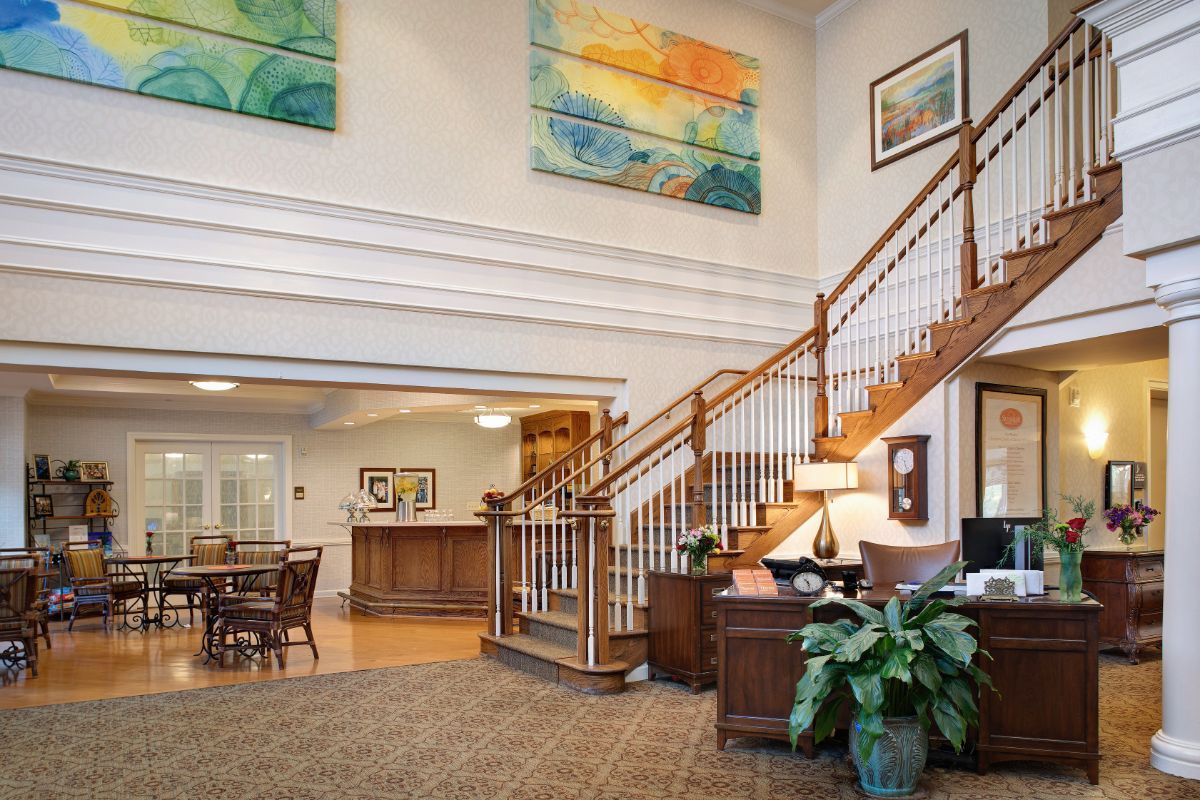What Sets Small Memory Carehomes Charlotte Above from Larger Facilities
What Sets Small Memory Carehomes Charlotte Above from Larger Facilities
Blog Article
Everything About Memory Care Services: Why Small Memory Treatment Houses Are a Wonderful Option
Memory treatment services play an important role in sustaining people with Alzheimer's and mental deterioration. Little memory care homes attract attention for their individualized method and intimate setting. With reduced staff-to-resident ratios, these homes promote more powerful links and tailored treatment. Residents gain from enhanced social interactions and a risk-free environment. As households explore options, comprehending the unique benefits of small memory care homes ends up being essential. What aspects should be thought about when picking the appropriate home?
Understanding Memory Care Provider
While several might be familiar with general elderly care choices, recognizing memory treatment services is essential for households facing the obstacles of cognitive decline. Memory treatment specifically satisfies people with conditions such as Alzheimer's condition and other types of mental deterioration. These services supply a structured setting that focuses on improving the lifestyle for residents through specialized treatment and support.Memory care centers are created to assure safety and safety and security, usually featuring protected settings to avoid roaming. Educated employee are available around the clock to assist with daily activities, drug administration, and personal care. Furthermore, memory treatment programs often include cognitive excitement tasks, customized to involve homeowners and advertise mental health. Households can take advantage of recognizing these solutions, as they enable informed choices regarding their liked ones' care, guaranteeing that their details requirements and choices are resolved in a compassionate and helpful way.
The Advantages of Small Memory Care Residences
Tiny memory treatment homes offer distinct benefits that can greatly boost the top quality of life for homeowners with cognitive disabilities. One substantial benefit is the intimate environment, which enables personalized communications among team and citizens. This smaller setup promotes purposeful connections, minimizing sensations of seclusion and stress and anxiety often experienced by people with memory issues.Additionally, the reduced staff-to-resident ratio in little memory care homes makes it possible for caretakers to offer even more mindful guidance and assistance. This method not only enhances safety but additionally promotes a complacency for the residents.Moreover, small memory treatment homes can adapt rapidly to the special needs and choices of each local, permitting a more homey ambience. Such a setting can encourage social interaction and participation in activities, ultimately improving the day-to-day experiences of those coping with cognitive disabilities.
Personalized Treatment Plans for Citizens
Individualized care strategies are important in memory care homes, as they provide to the unique requirements and choices of each local. These plans start with extensive analyses carried out by knowledgeable experts, that evaluate cognitive abilities, case history, and individual passions. This customized approach warranties that care is not just effective yet also considerate of each individual's self-respect and autonomy.Moreover, personalized care plans are adaptable, enabling adjustments as citizens' demands evolve in time. This flexibility fosters a complacency and knowledge, which is necessary for individuals dealing with memory difficulties. Caregivers are trained to implement these strategies constantly, providing support that lines up with the citizens' routines and preferences.Ultimately, individualized care strategies enhance the lifestyle for locals by promoting interaction, health, and independence, making them a basic facet of memory treatment solutions in tiny memory treatment homes.
Developing a Home-Like Atmosphere
Creating a home-like setting is critical for cultivating comfort and familiarity in memory treatment setups, as it considerably affects citizens' emotional wellness. Tiny memory care homes commonly prioritize individualized touches, such as warm shade schemes, household pictures, and familiar furniture setups, which help locals really feel a lot more at simplicity. Incorporating aspects similar to a traditional home, like cozy home and communal areas, encourages a feeling of belonging.Moreover, making use of all-natural light and outdoor areas can improve the environment, advertising relaxation and peace. Staff members play a substantial duty in preserving this setting by engaging with residents in a compassionate manner, treating them like family members. Routine tasks, such as food preparation or gardening, can likewise add to a home-like feel, offering chances for homeowners to join significant experiences. Overall, producing a nurturing environment supports cognitive feature and psychological stability, making it a vital element of memory treatment services.
Improved Social Interaction and Community
Enhanced social interaction and area are essential components of memory treatment solutions. By promoting personalized social engagement and developing a family-like environment, these solutions advertise purposeful connections among locals. Team activities and occasions additionally motivate participation, assisting people feel a lot more included and sustained.
Individualized Social Interaction
While social communication is crucial for overall wellness, several people with memory problems usually struggle to involve meaningfully with others. Customized social engagement in memory treatment homes addresses this challenge by developing customized tasks that deal with citizens' unique interests and abilities. By concentrating on private preferences, caretakers can promote connections that resonate deeply with each individual. Tasks such as art treatment, songs sessions, and directed conversations promote cognitive excitement and psychological expression. Additionally, little team settings motivate friendship and enable more intimate communications, boosting feelings of belonging. This approach not just fights sensations of seclusion however also empowers locals to keep a sense of identity, inevitably adding to enhanced psychological health and lifestyle.
Family-like Atmosphere
In a memory care setting, fostering a family-like atmosphere significantly boosts social interaction and develops a feeling of community amongst locals. Smaller memory care homes often prioritize intimate atmospheres, permitting residents to form closer connections with each other and staff participants. This nurturing environment promotes count on, which is vital for people with memory problems. Locals are most likely to talk and share experiences, creating a supportive network that alleviates feelings of isolation. The experience of common areas and routines adds to a feeling of belonging, even more motivating social communication (personalized memory care). In such settings, emotional bonds thrive, causing boosted overall health and a greater top quality of life for residents as they navigate their everyday experiences with each other
Group Activities and Events

Safety and Safety Attributes in Tiny Houses
Several little homes made for memory treatment incorporate crucial security and security functions to assure the wellness of residents. These homes commonly use safe entrance and departure points to prevent roaming, a common issue among people with memory problems. Furthermore, monitoring systems and alarm mechanisms improve surveillance, making certain that team can immediately reply to any unusual activities.Interior formats are tailored for safety, with decreased dangers such as sharp edges and clutter-free paths. Handrails and non-slip flooring are usually installed to minimize the threat of falls. Personnel are educated in emergency protocols, ensuring they are gotten ready for various situations.Moreover, customized care plans may consist of analysis of specific safety and security demands, providing customized services for every citizen. On the whole, these safety and security functions create a caring atmosphere where homeowners can prosper while keeping their self-respect and self-reliance.
Exactly how to Pick the Right Memory Care Home
Exactly how can family members guarantee they choose one of the most suitable memory treatment home for their enjoyed ones? The decision calls for cautious factor to consider of numerous aspects. Initially, families need to examine the center's team credentials and training, making sure that caretakers are experienced in managing memory-related conditions. Next off, it's vital to assess the home's setting, concentrating boutique memory care on safety features and whether it fosters a feeling of neighborhood and belonging. Going to the center can provide understanding right into daily tasks and the social ambience, which are vital for mental excitement and emotional well-being. Additionally, families should ask about the treatment strategies provided, guaranteeing they are tailored to specific demands. Taking into consideration the home's place and access for household gos to can add to a smoother change. By attending to these aspects, families can make an educated decision that prioritizes their enjoyed one's comfort and lifestyle in a memory treatment setup.
Frequently Asked Inquiries
What Certifications Should Team Members in Memory Care Houses Have?
Personnel in memory treatment homes should possess appropriate qualifications, experience in mental deterioration treatment, solid interaction abilities, and empathy. Ongoing training in behavior administration and therapeutic interventions boosts their capability to sustain citizens successfully.
Exactly How Do Memory Treatment Solutions Differ From Conventional Assisted Living?
Memory care solutions concentrate specifically on individuals with memory disabilities, supplying customized assistance and structured atmospheres. In comparison, standard assisted living supplies general aid with day-to-day activities, doing not have the tailored strategy necessary for those with cognitive difficulties.
What Types of Tasks Are Offered in Memory Treatment Residences?
Memory treatment homes commonly provide a selection of tasks designed to involve locals. Typical options include art treatment, songs sessions, cognitive games, exercises, horticulture, and gatherings, all intended at boosting health and cognitive feature.
Can Homeowners Bring Their Own Personal Belongings to Memory Care Homes?
Citizens can typically bring their own items to memory care homes, enabling them to customize their space - personalized memory care. This practice aids create a familiar atmosphere, advertising convenience and a sense of identity for the individuals

Exactly How Are Relative Involved in the Treatment Refine?
Relative play an important function in the treatment process, typically getting involved in decision-making, attending treatment meetings, and supplying psychological assistance. Their participation fosters a collective setting, boosting the local's overall health and quality of life. While many might be familiar with basic senior care options, recognizing memory care solutions is crucial for families dealing with the obstacles of cognitive decline. These services offer a structured atmosphere that concentrates on improving the top quality of life for residents through specialized care and support.Memory care facilities are designed to guarantee safety and protection, frequently including protected environments to stop roaming. Individualized treatment strategies are important in memory care homes, as they cater to the special demands and choices of each resident. Personnel participants in memory care homes need to have appropriate certifications, experience in dementia care, strong interaction abilities, and empathy. Memory treatment solutions concentrate specifically on individuals with memory disabilities, providing specialized assistance and structured environments.
Report this page